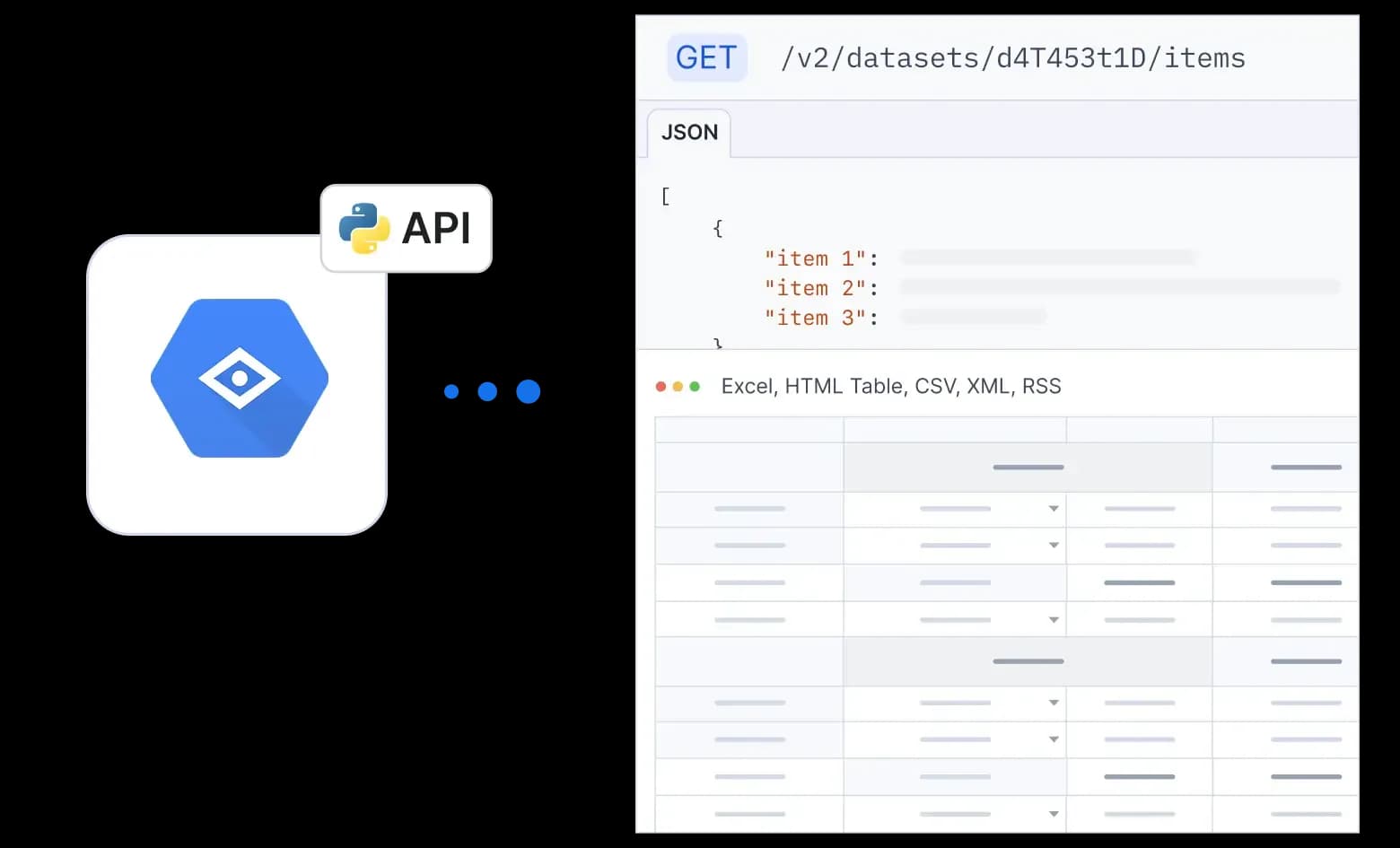Google Vision API Python Client
Extract Google Vision data with this Google Vision API Python client. Get programmatic access to website origins, thumbnail data, image dimensions, page titles, Image URLs, and more using simple Python code. Start free, no credit card required.

Trusted by industry leaders all over the world
Integrate Google Vision API
The Apify API client for Python is the official library that allows you to use Google Vision API in Python, providing convenience functions and automatic retries on errors. Get started with simple pip installation and robust error handling built-in.
Python
JavaScript
HTTP
MCP
1from apify_client import ApifyClient2
3# Initialize the ApifyClient with your Apify API token4# Replace '<YOUR_API_TOKEN>' with your token.5client = ApifyClient("<YOUR_API_TOKEN>")6
7# Prepare the Actor input8run_input = { "queries": ["apify"] }9
10# Run the Actor and wait for it to finish11run = client.actor("hooli/google-images-scraper").call(run_input=run_input)12
13# Fetch and print Actor results from the run's dataset (if there are any)14print("💾 Check your data here: https://console.apify.com/storage/datasets/" + run["defaultDatasetId"])15for item in client.dataset(run["defaultDatasetId"]).iterate_items():16 print(item)17
18# 📚 Want to learn more 📖? Go to → https://docs.apify.com/api/client/python/docs/quick-startGet data with Google Vision API Python client
Use our Python API client to extract Google Images data by providing search queries and the number of images you want to scrape. The API returns structured data, including image URLs, dimensions, origins, page titles, thumbnail URLs and dimensions, and content URLs.
Input
{ "queries": [ "Alfons Mucha" ], "maxResultsPerQuery": 300}Output
[ { "query": "Alfons Mucha", "title": "Alphonse Mucha - Simple English Wikipedia, the free encyclopedia", "origin": "simple.wikipedia.org", "imageUrl": "https://upload.wikimedia.org/wikipedia/commons/thumb/b/bd/Alfons_Mucha_-_F._Champenois_Imprimeur-%C3%89diteur.jpg/1200px-Alfons_Mucha_-_F._Champenois_Imprimeur-%C3%89diteur.jpg", "contentUrl": "https://simple.wikipedia.org/wiki/Alphonse_Mucha", "imageWidth": 1200, "imageHeight": 1630, "thumbnailUrl": "https://encrypted-tbn0.gstatic.com/images?q=tbn:ANd9GcQXLRmm59tZoOT4I5Q-wuqKAQHFmR9YY68_vikuak4tSAWhCMPf&s", "thumbnailWidth": 193, "thumbnailHeight": 262 }, { "query": "Alfons Mucha", "title": "Fine Art Print Moet & Chandon (Vintage Art Nouveau) - Alfons Mucha", "origin": "www.europosters.eu", "imageUrl": "https://storage.googleapis.com/pod_public/1300/128482.jpg", "contentUrl": "https://www.europosters.eu/art-photo/moet-chandon-vintage-art-nouveau-alfons-mucha-v90599", "imageWidth": 975, "imageHeight": 1300, "thumbnailUrl": "https://encrypted-tbn0.gstatic.com/images?q=tbn:ANd9GcTEyU6CbBP7P9c_8YDpDMdo_q_Vvdwv8eQ6taJmTbeaWhzh0QL6&s", "thumbnailWidth": 194, "thumbnailHeight": 259 }, { "query": "Alfons Mucha", "title": "Biography - Mucha Museum E-shop", "origin": "www.mucha.cz", "imageUrl": "https://www.mucha.cz/en/image/catalog/biography/alfons-mucha-loc-3c05828u.jpg", "contentUrl": "https://www.mucha.cz/en/biography", "imageWidth": 2877, "imageHeight": 3574, "thumbnailUrl": "https://encrypted-tbn0.gstatic.com/images?q=tbn:ANd9GcSNMsNKi6AeGHT4IVvA-ZjWkRHJ097t1Ohedme4k5cDoGiGyPU&s", "thumbnailWidth": 201, "thumbnailHeight": 250 }, { "query": "Alfons Mucha", "title": "Spring 1900, Alphonse Mucha", "origin": "rueroyalefinearts.com", "imageUrl": "https://rueroyalefinearts.com/wp-content/uploads/Mucha-edited-8.jpg", "contentUrl": "https://rueroyalefinearts.com/shop/art-nouveau/alphonse-mucha/spring-1900-by-alphonse-mucha/", "imageWidth": 2326, "imageHeight": 4722, "thumbnailUrl": "https://encrypted-tbn0.gstatic.com/images?q=tbn:ANd9GcTxaSjbx1cD1ofbqXDkQ05WUs1MeOk6pWaoytZDbx6p0JBi9Xw&s", "thumbnailWidth": 157, "thumbnailHeight": 320 }, { "query": "Alfons Mucha", "title": "Alphonse Mucha: Art Nouveau Visionary – NCMALearn", "origin": "learn.ncartmuseum.org", "imageUrl": "https://learn.ncartmuseum.org/wp-content/uploads/2021/07/L-114-Reverie-1897-769x1024.jpg", "contentUrl": "https://learn.ncartmuseum.org/resources/alphonse-mucha-art-nouveau-visionary/", "imageWidth": 769, "imageHeight": 1024, "thumbnailUrl": "https://encrypted-tbn0.gstatic.com/images?q=tbn:ANd9GcSTGSDQqiWMn865wOdmPu3cAExRVMDPwB_oLaEOXAW21TOXqD8&s", "thumbnailWidth": 194, "thumbnailHeight": 259 }]Sign up for Apify account01
Creating an account is quick and free — no credit card required. Your account gives you access to more than 5,000 scrapers and APIs.
Install Apify Python client02
Install the Apify Python client using pip: pip install apify-client. This package provides a simple interface to interact with Google Vision API from your Python applications.
Get your Apify API token03
Go to settings in the Apify console and navigate to the “API & Integrations” tab. There, create a new token and save it for later.
Integrate Google Vision API04
Navigate to the Google Vision API page and click on the API dropdown menu in the top right corner. In the dropdown menu, you can see API clients, API endpoints, and more. Use the provided Python code examples to integrate Google Vision API into your Python application.
Get your Google Vision data via API05
The Google Vision API returns structured JSON data that works perfectly with pandas, NumPy, and other Python data analysis libraries.

Why use Apify?
Never get blocked
Every plan (free included) comes with Apify Proxy, which is great for avoiding blocking and giving you access to geo-specific content.
Customers love us
We truly care about the satisfaction of our users and thanks to that we're one of the best-rated data extraction platforms on both G2 and Capterra.
Monitor your runs
With our latest monitoring features, you always have immediate access to valuable insights on the status of your web scraping tasks.
Export to various formats
Your datasets can be exported to any format that suits your data workflow, including Excel, CSV, JSON, XML, HTML table, JSONL, and RSS.
Integrate Apify to your workflow
You can integrate your Apify runs with platforms such as Zapier, Make, Keboola, Google Drive, or GitHub. Connect with practically any cloud service or web app.
Large developer community
Apify is built by developers, so you'll be in good hands if you have any technical questions. Our Discord server is always here to help!
Python-ready Google Vision data extraction
Connect to hundreds of apps right away using ready-made integrations, or set up your own with webhooks and our API.

No, Google does not provide a dedicated Python API client to get images from Google. Since there isn't an official Google Image Search Python API client to extract data from Google image results, people use web scraping tools like this Google Images Scraper Python library to visit the Google Images website, conduct searches, and extract image information from the pages they find.
Yes, you can try the Google Vision Python API client for free. Apify provides $5 in free usage credits every month on the Free plan, which allows you to process over 1,600 Google Vision API calls at no cost. The Python API client uses a pay-per-result pricing model at $3 per 1,000 vision analysis results ($0.003 per item).
You can extract comprehensive image data including image URLs, image width and height, thumbnail URLs and dimensions, website of origin, page titles, page URLs, and search query information using the Python API client. The data is returned in structured JSON format through Python objects and can be processed and exported as Excel, CSV, JSON, or HTML using Python libraries.
Yes, it is legal to use Python API clients to access Google Vision data for legitimate purposes such as market research, brand monitoring, SEO analysis, and AI model training. However, you should always respect the terms of service and use the data responsibly.
Getting started with our Google Vision Python API is easy — simply create a free Apify account, get your API token, and start using the Google Vision API in Python, JavaScript, CLI, cURL, OpenAPI, or MCP.

